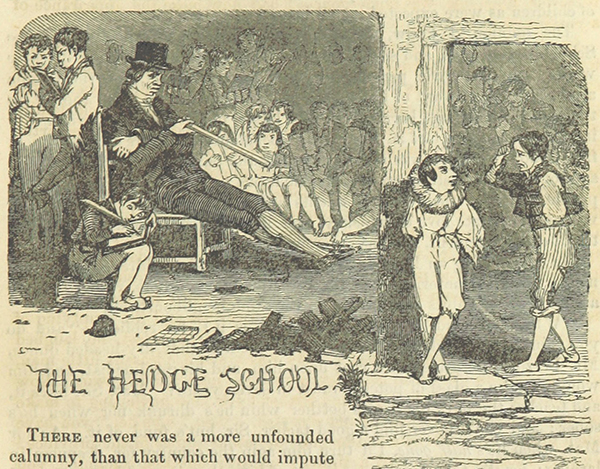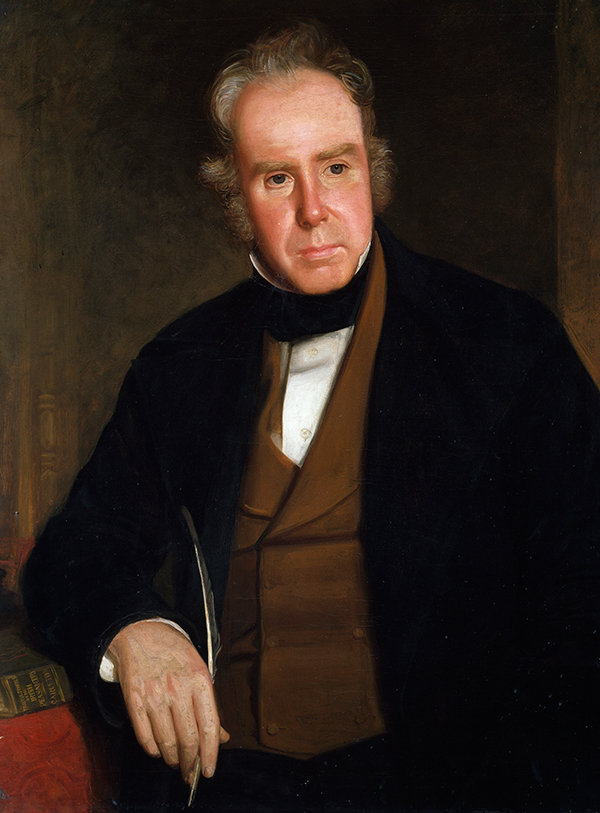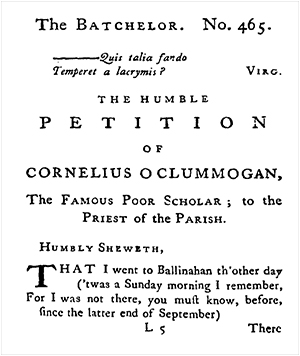The ‘poor scholar’ in late eighteenth- and early nineteenth-century writing
Published in Features, Issue 3 (May/June 2021), Volume 29By Ian Campbell Ross and Anne Markey
When Benedict Kiely published his biography of the Tyrone-born novelist and short-story writer William Carleton, he called it Poor scholar (1947). The title was apt and, in line with the book’s subtitle, ‘A study of the works and days of William Carleton’, powerfully evocative of the hedge school culture of rural Ireland in the eighteenth and early nineteenth centuries. Today, all readers with an interest in the history or literature of Ireland will be familiar with the term ‘poor scholar’. Few, though, will know how unfamiliar that term was, at least in print, before the days of Carleton himself, author of the best-known work centring on the wandering young scholar-teacher, simply entitled ‘The Poor Scholar’. This long story appeared in Traits and stories of the Irish peasantry (1833), five years after Thomas Croker Crofton had published ‘Scath-a-Legaune’, his tale of a poor scholar, John Curtin, who sets out on a hunt for treasure of which he has been told in a dream, in Fairy legends and traditions of the south of Ireland (1828).
A long history
Poor scholars have a long history, both in Ireland and throughout Europe. The wandering scholars of the Middle Ages included Irish figures such as Sedulius Scotus and John Scotus Eriugena who congregated in loose communities devoted to learning around Liège and Compiègne in the ninth century. Eight centuries later, the value of an existence devoted to disinterested scholarship found expression in the anonymous seventeenth-century poem Beatha an scoláire (‘The scholar’s life’):
Aboibhinn beath an scoláire
bhíos ag dánamh a léighinn
is follas díbh, a dhaoine,
gurab dó is aoibhne in Éirinn.
Sweet is the Scholar’s Life
busy about his studies
the sweetest lot in Ireland
as all of you know well [trans. Thomas Kinsella].
The ‘poor scholar’ familiar to Irish readers today had a more specific origin. After penal laws in 1695 outlawed Roman Catholic education at home and prohibited Catholics from sending their children to be educated abroad, hedge schools developed throughout the country. Even after the Catholic Relief Act of 1782 these schools continued to flourish, at times run by teachers of distinction, including the poets Aindrais Mac Craith (c. 1709–94) and Eoghan Ruadh Ó Súilleabháin (1748–94). In The hidden Ireland, Daniel Corkery considered poor scholars to have been extremely familiar to Ó Súilleabháin as ‘an institution of the place’. Well remembered in Ireland, the ‘poor scholar’ was, and remains, less familiar elsewhere. At the very end of the eighteenth century, Henry Mac Dougall thought it necessary, when writing for an English readership in Sketches of Irish political characters, of the present day, shewing the parts they respectively take on the question of the Union (London, 1799), to offer an extended definition of the term:
‘In Ireland it is a custom immemorially established, for those petty school-masters who teach in chapels, or temporary huts, freely to instruct such poor boys as come from remote places, and are unable to pay. The poor scholar while he remains at the school, goes home night and night about with his school-fellows, whose parents that can afford it occasionally supply him with a few old cloaths, as well as food and lodging. This appears to be a faint emanation of the ancient custom in Ireland, so celebrated by historians, of supplying at the national expence all foreign students with meat, drink, cloths, lodging, books, &c., &c.’

Above: A hedge school as depicted in William Carleton’s Traits and stories of the Irish peasantry.
Astonishingly, the Oxford English Dictionary has no entry for the term ‘poor scholar’. It is almost as surprising to find that the first recorded use of ‘an scoláire bocht’ dates from no earlier than the nineteenth century (‘Feartlaoi a thóg Stoinndis Aodh Ó Gráda síos’, Historical Irish Corpus 1600–1926).

WILLIAM CARLETON. Portrait by John Slattery, c. 1850s. In the 1820s and 1830s the figure of the ‘poor scholar’ made its way into popular literature in the work of Carleton and Crofton Croker. (NGI)
Eighteenth-century print culture
In eighteenth-century print culture, ‘poor scholar’ was generally used in one of two quite different ways. The term could refer to financially disadvantaged university students who entered their college not as ‘gentleman commoners’ but as sizars, supplementing their often-meagre funds by such menial tasks as waiting on fellow students at table. Among eighteenth-century Irish writers, both Laurence Sterne and Oliver Goldsmith were sizars, at Jesus College, Cambridge, and Trinity College, Dublin, respectively. The second use of ‘poor scholar’ was in eighteenth-century jest-books. A popular example by William Winstanley, first published in 1702, included this:
- What answer did the poor Scholar give to the Beggar, who said that he had a licence to Begg?
- That Lice he might have, but Sence he had none, to beg of a Poor Scholar.
If an scoláire bocht does not appear to exist in print in the eighteenth century, the ‘poor scholar’ does make an earlier appearance in Ireland than is generally known, with an extended and intriguing depiction of a poor scholar, by a long-overlooked poet, having recently been brought to light.
Dr Dominick Kelly
Dr Dominick Kelly (d. 1806), of Ballyglass, Co. Roscommon, first published verses in Edinburgh, where he was a medical student, in the late 1750s and continued to write, often very successfully, in a variety of poetic forms until the 1790s. His major work is a narrative pastoral sequence, The Battle of the Chaunters, which begins with the title poem ‘The Battle of the Chaunters, Fought near CASTLEBLAKENEY in the County of Galway, July 27th, 1767’.
Like other poems in the sequence, this account of what we would today call a ‘donnybrook’ was first published in the Dublin Mercury newspaper, owned by the Catholic bookseller James Hoey Jr. As a whole, the sequence offers a comic but entirely sympathetic account of country life, principally in County Roscommon, drawing on Kelly’s intimate knowledge of the kind of community about which he writes. Among much else, the poems offer tantalising snippets of information about rural culture in the 1760s, on subjects as varied as piping, hurling and folk remedies for dealing with unwanted pregnancy, reminding us that poetry can be a valuable source for historians. Along with other poems that had first appeared in the paper between 1768 and 1770, ‘The Battle of the Chaunters’ was also appended to Kelly’s comic novel, The history of Mr Charles Fitzgerald and Miss Sarah Stapleton (1770). Given a separate title-page, the collected verse appeared as Fugitive pieces.
‘The Humble Petition of Cornelius O Clummogan, the Famous Poor Scholar’
 Among the poems in Fugitive pieces, ‘The Humble Petition of Cornelius O Clummogan, the Famous Poor Scholar, to the Priest of the Parish’ is doubly remarkable. First, it offers the earliest extended representation of the poor scholar in literature. Second, it was written in English by a poet who was almost certainly bilingual, using what Máire Mhac an tSaoi described as ‘the marvellous, long, flexible line of […] Irish song-metres’ that superseded the syllabic metre of bardic poetry. In his petition, Cornelius describes his wanderings from school to school throughout the length and breadth of County Roscommon, in search both of knowledge and hospitality. His back is playing him up and he seeks free medical advice:
Among the poems in Fugitive pieces, ‘The Humble Petition of Cornelius O Clummogan, the Famous Poor Scholar, to the Priest of the Parish’ is doubly remarkable. First, it offers the earliest extended representation of the poor scholar in literature. Second, it was written in English by a poet who was almost certainly bilingual, using what Máire Mhac an tSaoi described as ‘the marvellous, long, flexible line of […] Irish song-metres’ that superseded the syllabic metre of bardic poetry. In his petition, Cornelius describes his wanderings from school to school throughout the length and breadth of County Roscommon, in search both of knowledge and hospitality. His back is playing him up and he seeks free medical advice:
I travell’d many a weary step betwixt Caltragh and Kinclare,
And went to Ballinlass itself, but Doctor Dillon was not there.
On reaching Ballinahan—a townland close to Mount Talbot and the River Suck—he learns that the doctor ‘cures all the common people without asking a feather’. This recommendation does not altogether please him, however, for, like poor scholars from the Middle Ages to his own day, Cornelius denies that his wandering in search of learning means that he is no better than a peasant: ‘“Common people!” says myself; “I know what that expression means”.’
Nor is Cornelius entirely convinced by Dr Dillon’s advice to bathe in cold water, a well-known eighteenth-century cure. Still, he now walks eight miles to Clunagh (or Cloonagh) House, close to the Suck, and owned in the 1760s by the Fallon family (all the poem’s named characters appear to refer to actual contemporaries). An aspiring teacher and poet, Cornelius hopes to earn his dinner at Clunagh by a display of his learning. Reactions range from unbridled admiration from one of the maids to unsympathetic scepticism from the tea-boy:
Then I took out my Book of Knowledge, and fell a reading very loud,
’Till all the servants gath’ring round me, look’d like a fair-day crowd.
‘O Gemni!’, cry’d the cook-maid, ‘I’d give my green gownd to read so gay’:
‘Pugh!’, says the tea-boy, ‘that lad would speak Latin with a face of clay.’
Fisticuffs follow until Cornelius’s head is plunged into a pot of broth, at which point Mrs Fallon interrupts the fray:
‘Oh God!’, says she, ‘the scholar is drown’d; ’tis a pity faith and troth.’
Rescued from this fate, Cornelius basks in the servants’ amazement at his learning until, dropping in a Latin tag, he inspires admiration even in the lady of the house:
When Mrs Fallon heard the Latin, as she’s always very discerning,
And extremely civil to lads (such as myself) of polite learning;
‘Come, Tom,’ says she, ‘lay the cloth: may the weavers steal my yarn
If I don’t respect him more than one with gold-lace, hounds and horn.’
Sadly, misfortune follows, for when Cornelius follows the doctor’s advice and bathes in the River Suck his satchel is devoured by the great house-dog, Hector. Deprived of his dinner, Cornelius is forced to seek simpler hospitality in the house of a shepherd, whose wife provides him with supper but is dismayed that she cannot offer the poor scholar more:
‘Mr O Clummogan!’, says she, ‘your learning deserves a greater honour:
But what you’ll do for a bed is a thing myself does not know;
For the cows eat all our straw last week, in the time of the snow.’
In the absence of her husband, Cornelius declines his hostess’s offer to share her bed and falls asleep on the floor in front of the fire. As he sleeps, he has a vision of himself at Clunagh House, lit up for a party, and of Mrs Fallon appealing on his behalf:
‘Gentlemen and ladies,’ says she, ‘’pon my honour I’ll tell you no fable.
Behold that worthy youth: altho’ he cannot dance or caper,
He’ll write a verse with any man that ever set pen to paper.
But Hector eat his sachel (for which I’ll hang the nasty thief:)
And four or five shillings from you would be a very great relief.’
The guests oblige, leaving Cornelius ‘as proud as I got Jason’s golden fleece’. This parodic version of an aisling—Cornelius has not national but self-interest in mind—leads finally to the petition of the poem’s title. In the poem’s closing lines, the poor scholar asks the parish priest to speak to Mrs Fallon in order to ‘make this my vision true’.
The comedy of his poem should not disguise the fact that Dominick Kelly alludes quite accurately to the relationship between poor scholars and the clergy. As Antonia McManus noted, hedge schools needed the approval of the parish priest. Eoghan Ruadh Ó Suilleabháin’s ‘Letter to Father Fitzgerald’ (c. 1785) is itself a verse petition seeking help from the parish priest of Knocknagree, asking that he announce at Mass that the poet will open a hedge school to teach pupils their alphabet, how to read and write, explain the catechism, before moving on to Euclid, trigonometry, gauging and English grammar.
Afterlife
Few readers today will have heard of Dominick Kelly but his verse was not quickly forgotten. A verse obituary that appeared in Walker’s Hibernian Magazine in December 1806 recorded the death of ‘Dominick Kelly, Esq., Author of the Celebrated Poem, called “The Battle of the Chaunters”’, while remembering him, in life, as a resident of that part of County Roscommon lying close to the River Suck. Yet when Kelly’s verse next appeared in print, over half a century later, the author had been both renamed and relocated. In A statistical and agricultural survey of the county of Galway (1824), Hely Dutton reprinted ‘The Battle of the Chaunters’ and ‘The Humble Petition’, while misattributing them to a Dr Dominick O’Kelly of Ballyglass, Co. Galway. There was worse to come. In The Hippocrene (1831), a verse collection by Patrick O’Kelly, author of Killarney (1791), ‘The Battle of the Chaunters’ was plagiarised under the more sentimental title ‘Red Rose; or the Harmonic Rivals’, while ‘The Humble Petition’ reappeared as ‘The O’Shaughnesseyanum’, with characters renamed and the setting changed to County Clare.
As noted, it was in the 1820s and 1830s that the figure of the ‘poor scholar’ made its way into popular literature, in the work of Crofton Croker and Carleton. By then, Irish poets were beginning to experiment with English verse forms and metres drawing on those of Irish-language verse of the eighteenth century. Unlike most largely forgotten writers, Dominick Kelly was not behind the times but ahead of them. Both he and ‘The Humble Petition of Cornelius O Clummogan’ deserve to be remembered in any history of the ‘poor scholar’.
Ian Campbell Ross is Emeritus Professor of Eighteenth-Century Studies at Trinity College, Dublin; Anne Markey teaches in Open Education, Dublin City University.
FURTHER READING
I. Campbell Ross & A. Markey, ‘Dominick Kelly’s “The Battle of the Chaunters” sequence from Fugitive pieces (1770)’, Eighteenth-Century Ireland 33 (2018).
I. Campbell Ross & A. Markey, ‘Dominick Kelly’s “The Humble Petition” and the Poor Scholar’, Eighteenth-Century Ireland 35 (2020).
A. McManus, The Irish hedge school and its books 1695–1831 (Dublin, 2002).
L. O’Higgins, The Irish classical self: poets and poor scholars in the eighteenth and nineteenth centuries (Oxford, 2017).
















